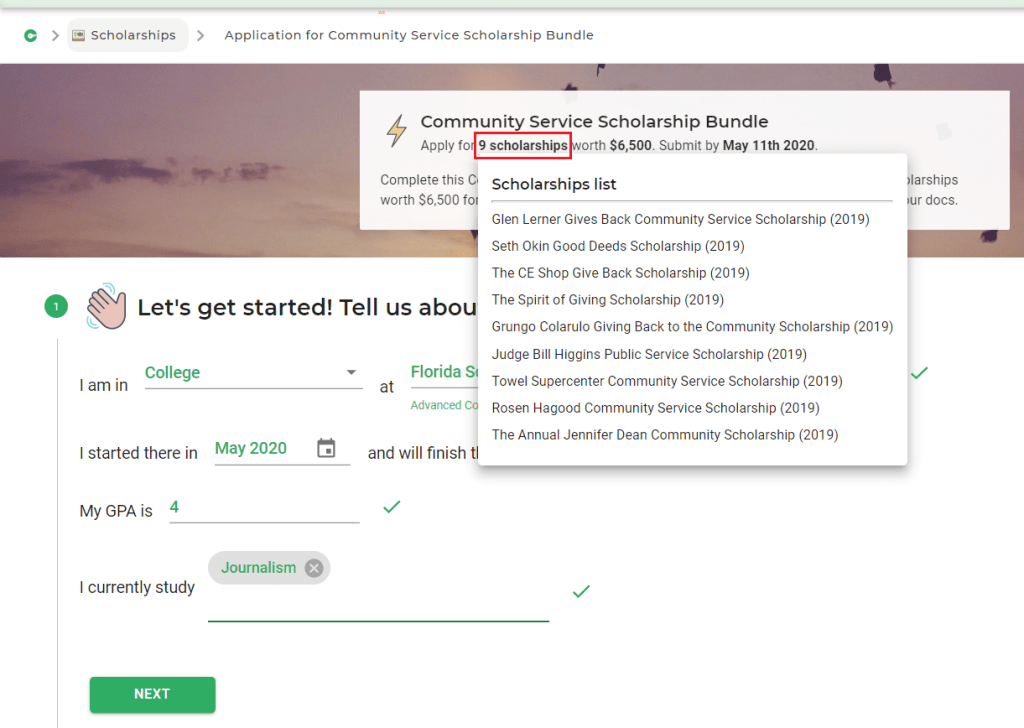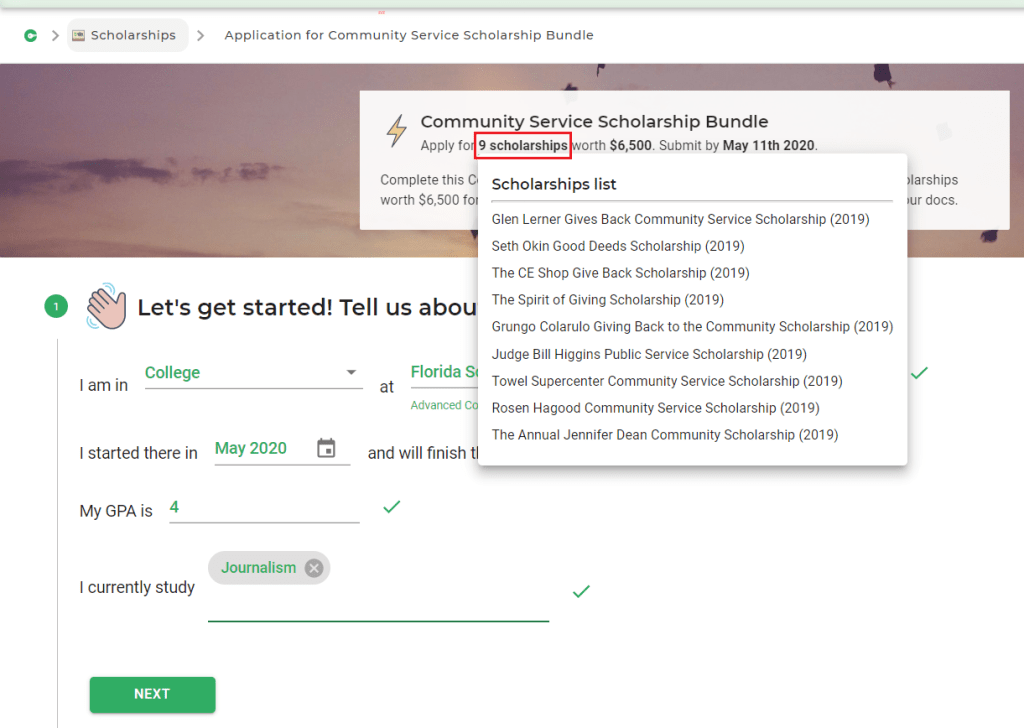
Hey there! Are you wondering if you can apply for multiple scholarships? Well, the answer is…maybe. In this article, we will dive into the world of scholarships and explore whether or not you can submit multiple applications. We’ll discuss the pros and cons, and provide you with some helpful tips to keep in mind when applying for scholarships. So, let’s get started and find out if you can maximize your chances of securing some extra funding for your education!
Curious to know more about applying for multiple scholarships? Well, look no further! In this article, we’ll provide you with all the information you need to make an informed decision. We’ll explore the possible advantages and disadvantages of submitting multiple scholarship applications, and share some strategies to help you navigate the process successfully. Whether you’re a high school student looking for financial assistance or a college student seeking additional funding, this article is for you. So keep reading to discover how you can make the most of your scholarship applications!

Understanding Multiple Scholarships
Scholarships play a crucial role in making education more accessible to students. They are essentially financial aid packages awarded to individuals based on various criteria, such as academic merit, financial need, or specific talents. But can you apply for multiple scholarships? In this article, we will explore the benefits of applying for multiple scholarships, the eligibility and application process, managing multiple applications, considerations and challenges, maximizing chances of success, financial implications, ethical considerations, successful scholarship application strategies, tips for scholarship renewal, and the overall conclusion of how multiple scholarships can empower your educational aspirations.
What are Scholarships?
Scholarships are financial opportunities granted to students to cover tuition, fees, and sometimes even living expenses. They can come from a variety of sources, including colleges, universities, private organizations, nonprofits, or government entities. Scholarships can be merit-based, need-based, or talent-based, and they are typically awarded to students who demonstrate exceptional potential or meet specific criteria set by the scholarship provider.

How do Scholarships Work?
Scholarships are competitive, so applying for multiple scholarships increases your chances of securing financial assistance for your education. Each scholarship has its own set of requirements, application process, and selection criteria. The selection process may involve evaluating academic transcripts, recommendation letters, personal statements or essays, and sometimes even interviews. Once selected, scholarship recipients receive either a one-time lump sum payment or multiple disbursements over several semesters or years.
Benefits of Applying for Multiple Scholarships
Applying for multiple scholarships offers several benefits. Firstly, it increases your chances of receiving financial aid. Scholarships are highly competitive, and by applying for multiple opportunities, you can significantly improve your odds of success. Secondly, multiple scholarships provide you with more financial flexibility. Instead of relying on a single scholarship, you can diversify your funding sources, potentially covering all your educational expenses. Lastly, applying for multiple scholarships exposes you to a broader range of opportunities and institutions, expanding your educational possibilities and potential networks.

Eligibility and Application Process
Understanding your eligibility for scholarships is essential before beginning the application process. Eligibility criteria can vary widely, including factors such as academic achievement, financial need, community involvement, or specific talents. Some scholarships have location restrictions or are limited to particular fields of study. It is important to carefully read and understand the requirements for each scholarship to ensure you meet them.
To find multiple scholarships, start by exploring resources such as scholarship search engines, college and university websites, community organizations, and professional associations. These sources often provide comprehensive lists of available scholarships along with their respective requirements and application deadlines.
Once you have identified the scholarships you are eligible for, carefully review the application instructions. Create a checklist of required documents, such as transcripts, recommendation letters, and essays, and prioritize your applications based on their deadlines. Make sure to tailor your applications to highlight your specific qualifications for each scholarship.
Tips for Finding and Applying for Multiple Scholarships
Finding and applying for multiple scholarships can be a daunting task, but with the right strategies, it can be more manageable. Here are some tips to help you navigate the process:
-
Start early: Begin your scholarship search as soon as possible to allow ample time for research, gathering documents, and completing applications.
-
Organize your materials: Create a folder or digital file to keep track of all necessary documents, such as transcripts, recommendation letters, and essays. This will simplify the application process and ensure you have everything you need.
-
Personalize your applications: Tailor your application materials to fit the requirements and criteria of each scholarship. Highlight your strengths and accomplishments that align with the scholarship’s purpose.
-
Seek guidance: Reach out to mentors, guidance counselors, or advisors who can provide valuable insights and advice. They can help you identify suitable opportunities and provide feedback on your application materials.
-
Proofread and edit: Carefully review your application materials for any errors or inconsistencies. Proofread your essays multiple times and ask others to review them as well to ensure they are compelling and error-free.
-
Stay organized: Keep a calendar or spreadsheet to track application deadlines, submission dates, and any follow-up requirements. This will help you stay on top of your applications and avoid missing important deadlines.
-
Apply to lesser-known scholarships: While popular scholarships may receive a large number of applicants, lesser-known scholarships often have fewer applicants and higher chances of success. Explore niche scholarships related to your field of study, interests, or personal background.
-
Follow up with scholarship providers: After submitting your applications, periodically check in with scholarship providers to ensure they have received your materials and to express your continued interest.

Managing Multiple Scholarship Applications
Managing multiple scholarship applications requires organization and effective time management. Here are some strategies to help you stay organized throughout the application process:
Creating a System to Track Applications
Develop a system to track your scholarship applications, deadlines, and submitted documents. This could be a physical planner, a digital calendar, or a spreadsheet. Include details such as the name of the scholarship, the application deadline, and any additional requirements or follow-up tasks.
Prioritizing Scholarship Deadlines
Prioritize scholarship deadlines based on their importance and alignment with your educational goals. Some scholarships may have strict deadlines, while others may have rolling admissions. Focus on the scholarships that offer the most significant financial assistance or align closely with your desired field of study.
Organizing Required Documentation
Create separate folders or digital files for each scholarship application to keep your documents organized. Label each file with the scholarship name, the document type, and the date of submission. This will streamline the process and ensure you have all the necessary materials readily available when needed.
Considerations and Challenges
While applying for multiple scholarships can be beneficial, there are some considerations and challenges to keep in mind:
Balance between Quality and Quantity of Applications
Applying for numerous scholarships can be time-consuming, so it’s important to strike a balance between the number of applications and the quality of each application. Avoid rushing through applications and take the time to craft thoughtful and compelling essays. Quality applications are more likely to stand out and increase your chances of success.
Avoiding Conflicting Scholarship Obligations
If you are awarded multiple scholarships, it is crucial to understand any obligations or restrictions associated with each award. Some scholarships may require you to maintain a minimum GPA, participate in specific activities, or attend a particular institution. Make sure to carefully read and understand the terms and conditions of each scholarship to avoid any conflicts or potential violations.
Understanding Scholarship Restrictions
Some scholarships may have restrictions regarding their use. For example, certain scholarships may only cover tuition and fees, while others may provide funding for textbooks, housing, or other educational expenses. It is important to understand the limitations of each scholarship and plan your budget accordingly.

Maximizing Chances of Success
To maximize your chances of success when applying for multiple scholarships, consider the following strategies:
Tailoring Applications to Meet Specific Scholarship Criteria
Each scholarship has its own set of criteria and requirements, so it is crucial to tailor your application materials accordingly. Highlight your achievements, experiences, and goals that align with the scholarship’s purpose and mission. This will demonstrate your fit and commitment to the scholarship provider’s values.
Seeking Guidance from Mentors or Advisors
Reach out to mentors, advisors, or professors who can provide guidance and support throughout the application process. They can offer valuable insights, review your application materials, and help you refine your essays or personal statements.
Developing a Compelling Essay
Crafting a compelling essay is essential for scholarship applications. Use this opportunity to showcase your achievements, goals, and motivations. Be authentic, compelling, and concise in expressing why you are deserving of the scholarship. Seek feedback from others to ensure your essay is polished and impactful.
Financial Implications
Applying for multiple scholarships can have several financial implications. Here are some factors to consider:
Weighing the Financial Impact of Multiple Scholarships
While receiving multiple scholarships can significantly reduce your educational expenses, it is crucial to evaluate the financial impact. Consider how the scholarships will cover your tuition, fees, and living expenses. Compare the total value of the scholarships with the overall cost of your education to determine if additional funding sources are necessary.
Effect on Other Financial Aid or Grants
Receiving multiple scholarships may affect other forms of financial aid, such as grants or student loans. Some institutions may reduce other financial aid awards to avoid over-awarding funding. It is important to be aware of any potential impacts on your existing aid packages and communicate with the financial aid office to understand the implications.
Tax Implications of Scholarship Income
Scholarships are generally tax-free if used for qualifying educational expenses such as tuition and fees. However, if your scholarship covers non-qualifying expenses like room and board, it may be subject to taxation. Be sure to consult a tax professional or visit the IRS website to understand any tax obligations associated with your scholarships.
Ethical Considerations
Maintaining honesty and integrity in the scholarship application process is of utmost importance. Here are some ethical considerations to keep in mind:
Maintaining Honesty and Integrity While Applying for Multiple Scholarships
Be truthful and accurate in your application materials. Avoid using false information, exaggerating achievements, or misrepresenting your qualifications. Scholarship providers value honesty and integrity, and any dishonesty may result in disqualification or future consequences.
Avoiding Fraudulent or Unethical Practices
Beware of scholarship scams and fraudulent organizations. Legitimate scholarships do not require an application fee, and reputable scholarship providers will not ask for sensitive personal information such as your social security number or bank account details. Research and verify the legitimacy of scholarship opportunities and only apply to recognized programs.
Ensuring Fairness in the Selection Process
Scholarship selection processes should be fair and unbiased. However, biases can inadvertently affect the outcomes. To ensure fairness, scholarship committees aim to evaluate each application objectively and consider the specific criteria established by the scholarship provider. They strive to reward deserving candidates based on their qualifications rather than personal connections or other external factors.
Successful Scholarship Application Strategies
To increase your chances of success, implement the following strategies during the application process:
Time Management and Organization Techniques
Set a schedule to allocate time for researching scholarships, preparing application materials, and submitting applications. Avoid procrastination by breaking down tasks into manageable chunks and setting deadlines for each step. Use organizational tools like calendars, to-do lists, or project management apps to stay on track.
Investigating Lesser-Known Scholarships
While popular scholarships may receive a large number of applicants, lesser-known scholarships often have fewer applicants and higher chances of success. Research scholarships specific to your field of study, interests, or personal background. Niche scholarships can offer unique opportunities with limited competition.
Applying Early and Following Up with Scholarship Providers
Submit your applications well before the deadlines to avoid last-minute stress. Applying early allows you to address any unforeseen issues or errors. After submitting your applications, periodically check in with scholarship providers to ensure they have received your materials. This displays your continued interest and professionalism.
Tips for Scholarship Renewal
If you are awarded a scholarship, make sure to understand the renewal requirements to maintain your funding for subsequent years. Here are some tips for scholarship renewal:
Understanding Scholarship Renewal Requirements
Carefully review the terms and conditions of your scholarship to understand the renewal requirements. These may include maintaining a minimum GPA, full-time enrollment, or active involvement in specific activities or organizations. Keep track of these requirements and ensure you meet them consistently.
Maintaining Academic Progress and Eligibility
Academic progress is often a key criterion for scholarship renewal. Maintain a strong GPA and actively engage in your studies to meet the scholarship’s academic expectations. Seek support from academic advisors or mentoring programs if you encounter any challenges.
Seeking Support from Scholarship Providers
If you face unexpected financial or personal hardships that may impact your eligibility, contact the scholarship provider for guidance. Many scholarship programs offer support services or have mechanisms in place to assist students who encounter difficulties. Maintaining open communication can help you navigate challenging situations and maintain your scholarship.
Conclusion
Applying for multiple scholarships can open doors to educational opportunities and provide significant financial assistance. By understanding the eligibility requirements, effectively managing applications, maximizing chances of success, and considering financial and ethical implications, you can empower your educational aspirations through multiple scholarships. Take advantage of available resources, seek guidance when needed, and approach the application process with organization and determination. Remember, the pursuit of multiple scholarships requires effort and dedication, but the rewards can be life-changing. Good luck on your scholarship journey!





